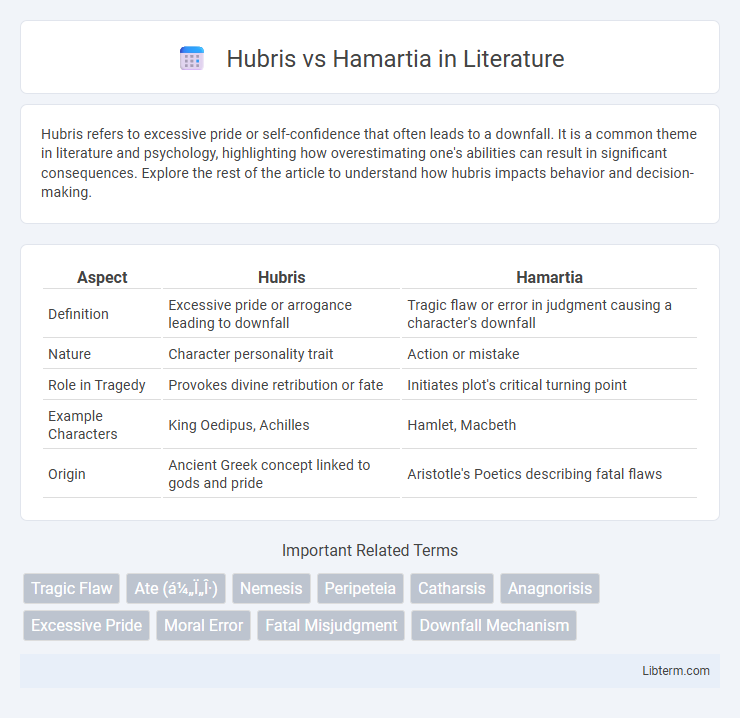Hubris refers to excessive pride or self-confidence that often leads to a downfall. It is a common theme in literature and psychology, highlighting how overestimating one's abilities can result in significant consequences. Explore the rest of the article to understand how hubris impacts behavior and decision-making.
Table of Comparison
| Aspect | Hubris | Hamartia |
|---|---|---|
| Definition | Excessive pride or arrogance leading to downfall | Tragic flaw or error in judgment causing a character's downfall |
| Nature | Character personality trait | Action or mistake |
| Role in Tragedy | Provokes divine retribution or fate | Initiates plot's critical turning point |
| Example Characters | King Oedipus, Achilles | Hamlet, Macbeth |
| Origin | Ancient Greek concept linked to gods and pride | Aristotle's Poetics describing fatal flaws |
Understanding Hubris: Definition and Origins
Hubris, derived from ancient Greek tragedy, refers to excessive pride or arrogance that defies moral or divine laws, often leading to a protagonist's downfall. Its origins trace back to classical literature where characters exhibiting hubris challenge gods or societal norms, symbolizing a critical flaw in human nature. Understanding hubris involves recognizing it as a deliberate overestimation of one's abilities or status, which contrasts with hamartia's broader concept of a tragic error or flaw.
The Concept of Hamartia in Literature
Hamartia in literature refers to a protagonist's tragic flaw or error in judgment that leads to their downfall, often rooted in a moral weakness or ignorance. This concept is central to classical tragedy, where the hero's hamartia evokes pity and fear, enabling catharsis in the audience. Unlike hubris, which is excessive pride or arrogance, hamartia encompasses a broader range of failings that contribute to narrative tension and character complexity.
Hubris and Hamartia: Key Differences
Hubris refers to excessive pride or self-confidence that leads individuals to overstep moral boundaries, often resulting in their downfall. Hamartia, in contrast, is a tragic flaw or error in judgment intrinsic to a character that triggers a sequence of negative events. The key difference lies in hubris being an overbearing arrogance, while hamartia represents a fundamental character flaw or mistake.
Historical Context of Hubris and Hamartia
Hubris, rooted in ancient Greek culture, referred to excessive pride or defiance against the gods, often leading to severe divine punishment and social downfall. Hamartia, a concept introduced by Aristotle in his Poetics, describes a tragic flaw or error in judgment within a character, which propels the narrative towards catastrophe. Both terms are fundamental in classical tragedy, reflecting the cultural emphasis on moral limitations and human fallibility in ancient Greek literature and society.
Hubris in Greek Tragedy
Hubris in Greek tragedy represents excessive pride or arrogance that defies the gods or natural order, often leading to the protagonist's downfall. This overweening pride blinds characters to their limitations and provokes divine retribution, a central theme in works like Sophocles' "Oedipus Rex" and Aeschylus' "Agamemnon." Hubris distinguishes itself from hamartia by being an intentional prideful act rather than a tragic flaw or error in judgment.
Hamartia’s Role in Character Development
Hamartia serves as a pivotal flaw in character development, exposing inherent weaknesses that drive the protagonist's journey and tragic downfall. Unlike hubris, which specifically denotes excessive pride, hamartia encompasses a broader range of errors or moral faults that reveal complexity and evoke empathy. This nuanced imperfection deepens narrative tension and enriches the psychological realism of characters in classical and modern storytelling.
Famous Examples of Hubris in Classic Literature
In classic literature, hubris often leads to the downfall of iconic characters such as King Lear in Shakespeare's tragedy, whose excessive pride blinds him to the loyalty of his daughters. Similarly, in Greek mythology, Oedipus exhibits hubris by attempting to defy prophecy, resulting in catastrophic consequences. These examples highlight how hubris, defined as overbearing pride or arrogance, contrasts with hamartia, the tragic flaw or mistake that precipitates a hero's demise.
Notable Instances of Hamartia in Tragic Heroes
Hamartia, often defined as a tragic flaw or error in judgment, is prominently exemplified in characters such as Oedipus from Sophocles' "Oedipus Rex," whose determination to uncover the truth leads to his downfall. Another notable instance is Shakespeare's Macbeth, whose overwhelming ambition blinds him to moral consequences, setting a chain of fatal events into motion. The nuanced depiction of hamartia in these tragic heroes highlights the human vulnerability and complexity that drive the narrative tension in classical and Elizabethan tragedies.
Psychological Perspectives on Hubris and Hamartia
Psychological perspectives on hubris reveal it as an excessive pride or self-confidence often linked to narcissistic personality traits and impaired judgment, leading to destructive behaviors. Hamartia, rooted in Aristotle's tragedy theory, reflects a critical psychological flaw or error in judgment that precipitates a protagonist's downfall, highlighting cognitive biases and moral weaknesses. Both concepts emphasize the impact of internal psychological dynamics on decision-making and the consequences of unchecked ego or flawed reasoning.
Hubris vs Hamartia: Impact on Modern Storytelling
Hubris and hamartia serve distinct roles in modern storytelling, with hubris representing excessive pride leading to a character's downfall, while hamartia refers to a tragic flaw or error in judgment that drives the narrative conflict. Contemporary narratives harness hubris to explore themes of arrogance and its consequences, often highlighting moral lessons about human limitations. Hamartia deepens character complexity by revealing inherent imperfections, making protagonists relatable and their struggles compelling in diverse genres such as drama, fantasy, and thriller.
Hubris Infographic

 libterm.com
libterm.com